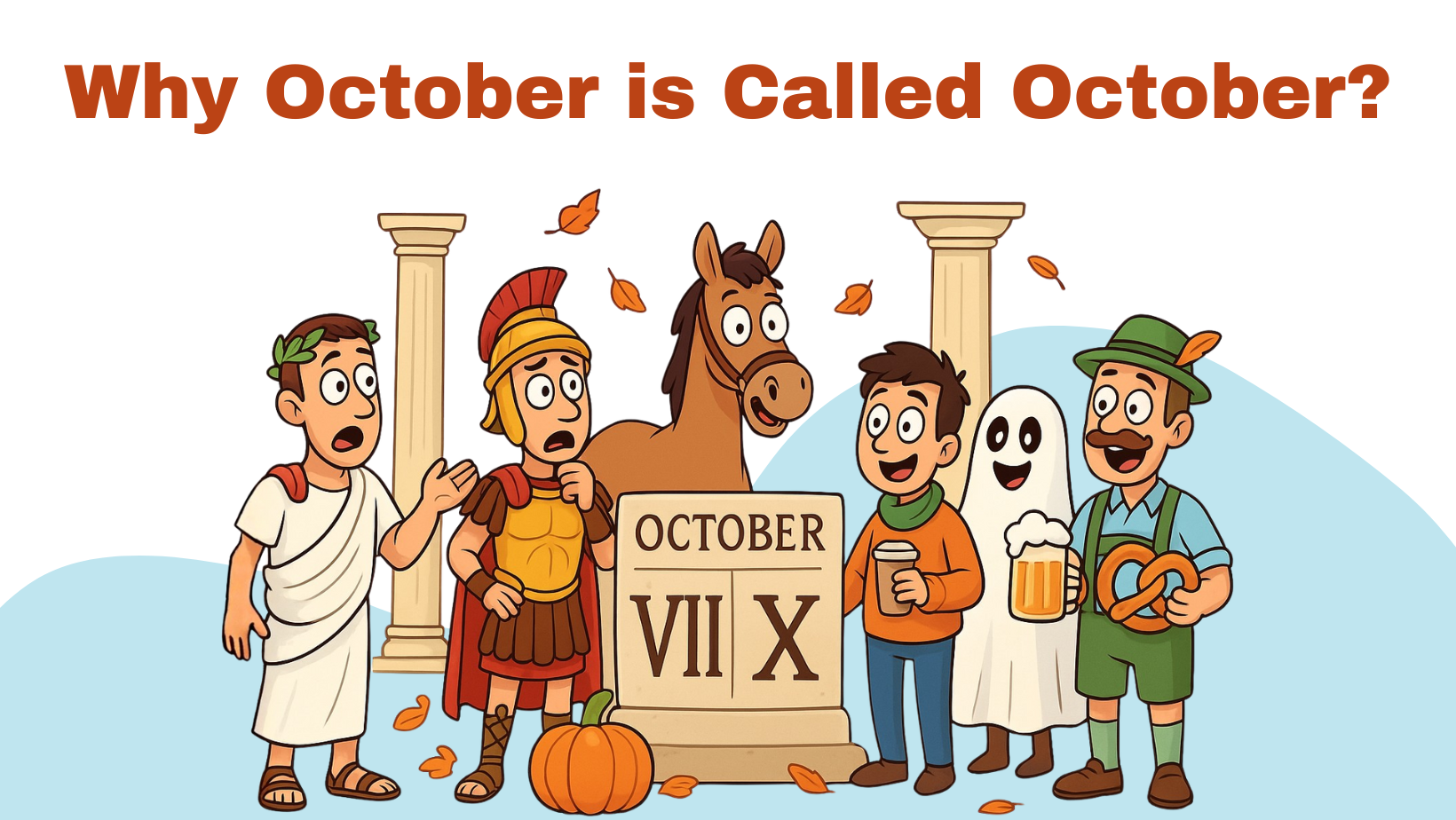
💀 Why October Is Called October
(Spoiler: the math doesn’t add up — blame the Romans). Look at your calendar. October is the tenth month.
Now look at its name: octo — Latin for “eight.”
That’s right. The Romans somehow managed to invent an empire, concrete, and plumbing… but couldn’t count their own months.
So what happened? Let’s rewind a couple of millennia to a time when Rome was still a wannabe superpower, the year began in March, and the gods had more control over your schedule than any boss ever will.
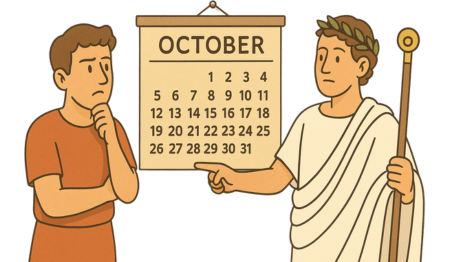
🏺 When “Winter” Didn’t Deserve Months
In the beginning, the Roman calendar was a minimalist masterpiece — just ten months long.
It kicked off in March (Martius, the month of Mars — because war season obviously deserved the spotlight) and ended in December.
Between December and March? Nothing.
Winter was a no-man’s-land — an uncounted limbo where nobody farmed, fought, or probably bathed. Time just… stopped. Here’s how their year looked:
| Original Roman Month (Latin) | Literal Meaning | Position in the Early Roman Calendar | Modern Equivalent | Notes |
|---|---|---|---|---|
| Martius | Named after Mars, god of war | 1 | March | The year originally began in March — fitting for a warlike people. |
| Aprilis | Possibly from aperire (“to open”) — spring’s opening | 2 | April | Associated with growth and renewal. |
| Maius | Named after Maia, goddess of fertility | 3 | May | Symbolized abundance and rebirth. |
| Iunius | Named after Juno, goddess of marriage | 4 | June | Linked to weddings and prosperity. |
| Quintilis | “Fifth month” (quinque = five) | 5 | July | Renamed Julius in honor of Julius Caesar. |
| Sextilis | “Sixth month” (sex = six) | 6 | August | Renamed Augustus for Emperor Augustus. |
| September | “Seventh month” (septem = seven) | 7 | September | Became the ninth month after January and February were added. |
| October | “Eighth month” (octo = eight) | 8 | October | Became the tenth month — but kept its old name. |
| November | “Ninth month” (novem = nine) | 9 | November | Originally the ninth month — later became the eleventh. |
| December | “Tenth month” (decem = ten) | 10 | December | Originally the tenth month — now the twelfth. |
Back then, October really was the eighth month — a proud, hardworking middle child of the Roman year.
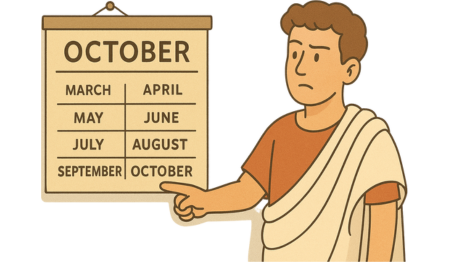
👑 Then Came Numa:
The Great Calendar Plot Twist: Enter King Numa Pompilius, Rome’s second king and a man who apparently looked at the calendar and said,
“We should really do something about that three-month black hole of nothingness.”
Numa added January (Ianuarius, dedicated to Janus, the god of doors and beginnings) and February (Februarius, the month of purification).
Suddenly, October got bumped down the line — from eighth to tenth.
But did the Romans bother renaming it? Of course not.
This was ancient Rome, where tradition trumped logic, and bureaucracy was already an art form.
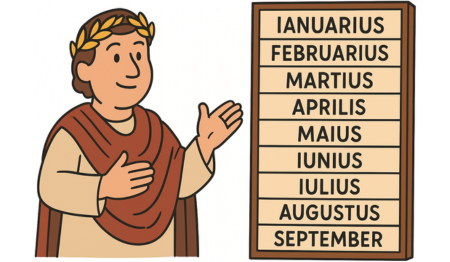
🧮 Calendar Chaos:
Why No One Fixed It Later! Fast-forward to Julius Caesar, who in 45 BCE reformed the calendar again (because apparently nobody knew what day it was anymore).
He introduced the Julian calendar, which finally synced Rome’s timekeeping with the solar year.
But even Caesar — the man who renamed a whole month after himself (July) — didn’t touch October’s name.
By then, the confusion had become tradition. And Rome loved tradition almost as much as it loved pretending everything was under control.
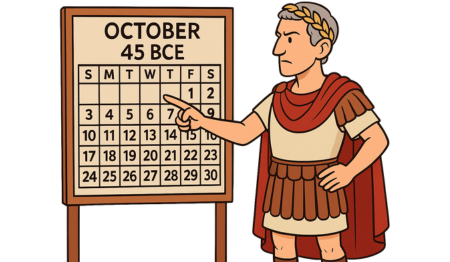
🌀 Monthly Identity Crisis
October — the month where summer feels like a myth, sweaters become personality statements, and pumpkins conquer everything from lattes to politics.
But have you ever wondered why this tenth month insists on being called something that literally means “eight”?
Spoiler alert: because the Romans, those self-proclaimed geniuses of civilization, forgot to update their software — or maybe just didn’t care.

💬Why October Missed the Memo!
Think of it like a Roman group chat gone wrong — Numa adds two new months, everyone’s talking about it, and poor October’s out of signal.
By the time the message finally comes through, it’s centuries later and Julius Caesar’s already taken the credit.
So October just shrugs, keeps its old name, and pretends it was a branding choice.

Traditions That Time Forgot
Centuries passed, and the Romans—being Romans—decided consistency was overrated. They left October’s name as it was, because why fix a perfectly confusing system? It’s the historical equivalent of still using your old email from 2003—technically functional, nostalgically ridiculous.
But while the name froze in time, the month itself didn’t. It kept evolving, shedding its war paint and picking up pumpkins along the way…
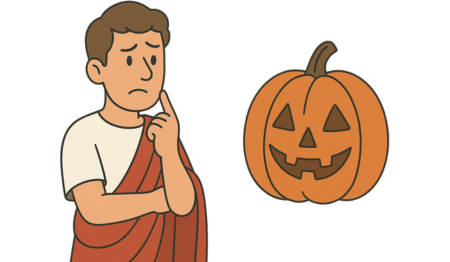
🐴 From Warhorses to Pumpkin Spice
In ancient Rome, Octobris marked the end of the war season — capped by the bizarre October Horse sacrifice, a blood-soaked farewell to Mars, the god of war.
Fast forward two millennia, and October’s still full of rituals — just with more caffeine and fewer horses.
Now, instead of warriors, we have pumpkin patch selfies, haunted houses, and coffee shop pilgrimages.
Because if history teaches us anything, it’s this:
humans will happily reinvent every tradition before ever fixing their calendars.
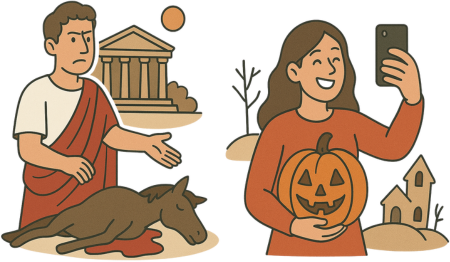
Halloween: From Ghosts to Candy
October might be about spooky costumes and candy in one part of the world, but hop across the Atlantic, and it’s all about giant mugs of beer and pretzels as big as your head. Yes, Oktoberfest, where even if you’re terrible at dancing, the polka doesn’t care—it welcomes all.
Then there’s Halloween, or should we say, the ultimate procrastinator’s holiday. It started as Samhain, where ancient Celts believed ghosts roamed free. Today, it’s when you throw on last-minute costumes that look suspiciously like pajamas and hope you don’t run into that one neighbor who gives out toothbrushes.

The Birthstones of October
October is like the cool, artsy cousin of the calendar year—the one who wears scarves before anyone else and knows all the good indie bands. Its birthstones, Opal and Tourmaline, sound fancy, and they come with deep meanings—Opal for creativity, Tourmaline for protection.
But if October had a theme song, it’d be all about transformation. The leaves turn, the days get shorter, and you transform your wardrobe from beachwear to layering like your life depends on it.

Nature’s Bounty
The marigold, symbolizing creativity, and the cosmos, which represents peace, both grow abundantly in October. Coincidence that this month can be chaotic but beautiful? Probably not.

Literary Vibes
October has inspired many great works, but let’s be honest, it’s the spooky vibes that really steal the show. From Edgar Allan Poe to modern horror flicks, October is the month where dark, moody settings are practically obligatory. And don’t forget the endless marathons of “Hocus Pocus” and “The Nightmare Before Christmas”—movies that solidify October’s place in the creepy yet cozy pantheon.
In literature, poets like Robert Frost wax poetic about October’s melancholy charm: “The leaves, they’re falling, the wind, it’s howling, and yet here I am, still pretending to enjoy pumpkin-flavored everything.”

Historical Highlights
October has seen some monumental moments, like the birth of the People’s Republic of China (October 1, 1949) or Columbus setting foot in the Americas (October 12, 1492). And while those are impressive, nothing tops the sheer terror of the Protestant Reformation when Martin Luther dropped the ultimate diss track—his Ninety-five Theses—on October 31, 1517. He didn’t hand out candy, but he sure changed the world.
This month is rich with significant historical milestones, such as the founding of the United Nations on October 24, 1945, and the launch of Sputnik 1 on October 4, 1957, which initiated the space age.

🌎 October Around the World:
Same Month, Different Vibes! The Romans may have invented the name, but the world’s been remixing it ever since.
In Spanish it’s octubre, in French octobre, in Italian ottobre — all proudly carrying the same math error like a family heirloom nobody dares question.
Meanwhile, the Anglo world turned it into October, added Halloween, and called it a vibe.
Hop over to Japan, and October is Jūgatsu — literally “tenth month.”
The Japanese quietly fixed what Rome never could and moved on.
Leave it to the Romans to start a linguistic bug that half the planet still runs on.
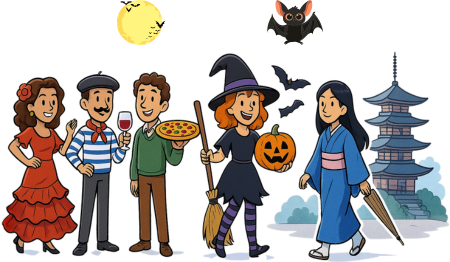
A Global Perspective
While some of us are breaking out jackets and dodging rakes, others are just getting ready for spring in the Southern Hemisphere. In places like Argentina or Australia, October marks blooming flowers and fresh starts.
Meanwhile, Navaratri, an October festival in India, celebrates the triumph of good over evil, which feels very on-brand for a month where you conquer your own demons—whether they be Halloween candy or looming deadlines.
This month hosts various cultural celebrations worldwide, including Diwali, the festival of lights, in India, and Día de los Muertos, honoring deceased loved ones in Mexico, Peru and many other Latino-American nations.
In Peru, October is the “Mes Morado,” marked by the massive Señor de los Milagros processions. But it’s not all solemnity—on October 31st, Peruvians celebrate El Día de la Canción Criolla, a joyful homage to their rich musical heritage, offering a vibrant contrast to Halloween’s spooky costumes and candy while also sparking a cultural war nationwide.
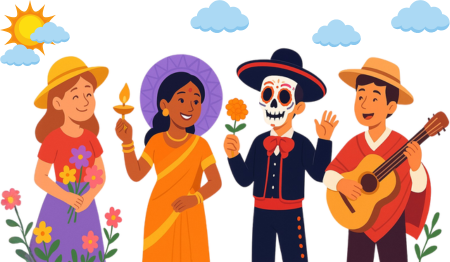
🌍 How the World Says “October”
You’d think after a few thousand years someone would fix the “eight-but-it’s-ten” issue — but no. Instead, every language just looked at the Roman mess and said, “Sure, we’ll keep it.”
Across the world, October has kept its Latin DNA, even if it got a makeover in each tongue. Some cultures embraced the Roman name; others swapped it for something poetic, seasonal, or downright unpronounceable after two beers at Oktoberfest.
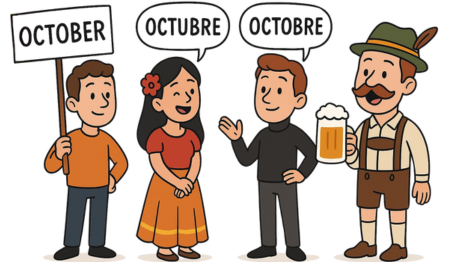
🗓️ October in Other Languages
At Kasa de Franko, we love seeing how one word can travel the world, changing its accent but keeping its spirit. October may have lost its Roman math, but its name stayed loyal to its Latin roots — “octo,” meaning eight. From octubre to ottobre, the sound of the season is instantly familiar, no matter the continent.
| Language | Name | Literal Meaning or Origin | Cultural Note |
|---|---|---|---|
| Latin | Octobris | “Eighth month” | The OG version — back when it actually made sense. |
| Spanish | octubre | From Octobris | Celebrated with El Señor de los Milagros processions and La Canción Criolla. |
| French | octobre | Same root, fancy pronunciation | The month Parisians pretend summer never ended. |
| Italian | ottobre | From Octobris | Grape harvests, chestnuts, and espresso-fueled melancholy. |
| Portuguese | outubro | From Octobris via sound mutation | Month of independence celebrations and wild weather mood swings. |
| German | Oktober | Still Roman at heart | Home of Oktoberfest, where calendars and sobriety both lose meaning. |
| Russian | Октябрь (Oktyabr’) | From Latin Octobris | Famous for the October Revolution — nothing spooky about that. |
| Japanese | 10月 (Jū-gatsu) | “Tenth month” | Logical, simple, and what the Romans should have done. |
| Chinese | 十月 (Shíyuè) | “Tenth month” | Again, sensible — because some civilizations preferred math to mythology. |
| Arabic | أكتوبر (Uktūbar) | Borrowed from European languages | Modern adoption, but still carries that Roman ghost. |
| Quechua (Andes) | Killa pukyu (varies by region) | “Month of springs or flowers” | Reflects the Southern Hemisphere’s spring rebirth. |
🧭 A Global Echo
So while Rome’s naming logic collapsed faster than its empire, october somehow went global — not by design, but by inertia.
It’s the linguistic equivalent of a typo that the whole world agreed to live with.
From pumpkin lattes in Portland to purple processions in Lima, everyone celebrates the tenth month their own way… even if the name still insists it’s the eighth.
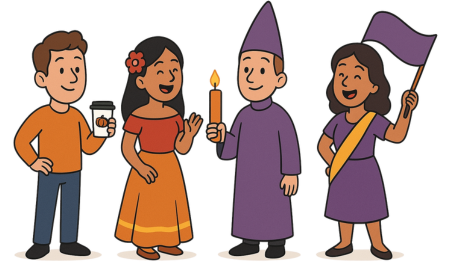
Fun October Facts
Pumpkin Pandemonium: Its unofficial mascot, the pumpkin, wasn’t even native to Europe when Halloween was born. The Irish used turnips for their jack-o’- lanterns. Imagine trying to carve one of those—no thanks!
Weirdest Record: It holds the world record for the most UFO sightings. Maybe it’s the long, eerie nights…or just too many people high on sugar.

Embrace the October Magic
October, despite its name blunder, is a month of magic, mystery, and pumpkin overload. Whether you’re dodging flying leaves, watching horror marathons, or battling the guilt of eating your kids’ trick-or-treat candy, this is the month where anything can happen. It’s about transformation, celebration, and a little bit of madness. So, throw on that scarf, sip that overpriced latte, and embrace October in all its spooky, leafy glory.

Explore the Origins of Month Names
Ever wondered how the months got their names? Check out our blog, Months & Days, for a fun and enlightening exploration of the history behind each month’s title. It’s like taking a historical journey filled with intriguing tidbits and quirky facts you never knew you needed!

Spice Up Your Spanish: Romance Awaits!
Looking to add some excitement to your Spanish? Jump into our blog, Things Spanish People Say in Bed, where you’ll find a playful collection of romantic phrases to elevate your conversations. Ready to turn up the heat even more?
Check out El Sexi Chupacabras for even bolder expressions and sultry vocabulary. Learn to say “I love you” and so much more—with style!

Myths and Legends Await
If you’re intrigued by the mythical and the mysterious, our Legends & Folktales section is your portal to captivating stories featuring legendary figures like La Santa Muerte, La Llorona, La Ciguapa, and the infamous El Chupacabras. Immerse yourself in the rich heritage of Hispanic folklore and let these tales spark your imagination.

Learn with Laughter
Want to enjoy some laughs while you learn? We’ve got you covered! While phrases like ¡Feliz Año Nuevo! and ¡Me Gusta la Chucha de tu Madre! might bring a chuckle, we focus on respectful and engaging language learning. Visit our About section to discover what fuels our passion for teaching, and don’t miss the free lessons at Kasa de Franko!

Kasa de Franko: Spanish Wonderland
Curious about Kasa de Franko? Here, we provide flexible, enjoyable, and affordable Spanish lessons for learners of all ages. Our founder, Franko, a polyglot with a profound love for language and culture, brings enthusiasm to every class. Want to give it a shot?

Free Spanish Classes
Ready to start your Spanish adventure? Visit Kasa de Franko, your cultural and linguistic haven. Sign up for a free class today and dive into a world rich in history, language, and culture. Click that red button to begin your journey and always remember….

